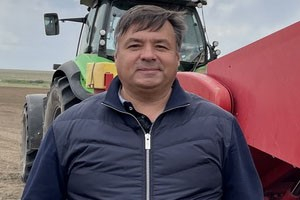Pavel Luschak, director of Naydorovskoye LLP, Araganda region, Republic of Kazakhstan:
– The farm was established in 2000, and since then the area of our farmland has grown to 20,000 hectares. We have been planting potatoes for 10 years, we started with 73 hectares, and today we have 416 hectares under cultivation. We also grow cereals, oilseeds and legumes.
Like many of our colleagues, we grow potato seeds from elite seed material purchased in Europe. Usually 40-60 tons is enough for us to get enough high reproduction seeds.
The company has relied on agricultural machinery from the world’s leading manufacturers, primarily John Deere and GRIMME. But on our fields you can also meet tractors “Belarus” and Russian “Kirovtsy”.
Plant protection products on the Kazakh market are represented by products from Germany, Switzerland, China and Russia. Their large selection allows farmers to successfully cope with the entire list of diseases and pests that pose a threat to the crop.
Since 2014, we have been watering, mainly due to climate change, but the economic factor also played a role. Practically, we found out that in terms of productivity, one hectare of irrigation replaces 30-35 hectares of rainfed land. Now the cost of the crop is kept within 60-65 tenge (1 ruble/4.85 tenge) per kilogram. At the same time, large ware potatoes are sold at 100-120 tenge per kilogram, and a 45+ fraction is half cheaper.
About 56 hectares in Naidorovskoye LLP are set aside for early-ripening potatoes, which we begin to dig in the first ten days of August. This season, the culture shows good results. For example, from the Corinna bush, one of the two main early varieties, we get a kilogram of tubers, that is, the yield is 40-43 tons per hectare.
Products are sold both through intermediaries and through retail chains. The entire volume after harvesting is sent to our storage facilities, and then we sell potatoes in equal installments every month until the start of the next season.
In 2023, we will launch the primary processing of tubers: we install a sink, organize cleaning and packaging in vacuum packaging. For many Kazakhstani farmers who have difficulty selling substandard products, such a step would be a real salvation. And we
thus we hope to establish a profitable sale of small potatoes.
In the near future, the PepsiCo company plans to enter Kazakhstan, whose representatives came to our enterprise. The issue of growing potato chips for a large processing plant, which will be built on the territory of the republic, was discussed. We are ready for such cooperation and will be happy to supply our products to the faction 45+ business partners who pay a fair price for it.
Even 20 years ago, Kazakhstan grew only 30-40 percent of its own needs in potatoes, and only after 2014 the republic reached full self-sufficiency. State support measures contributed to such a rapid growth of the sub-sector, but in the end we got overproduction. Part of the problem can be solved by
export of products, for example, to Uzbekistan, Tajikistan and even Russia.
But today farmers are in dire need of new markets, otherwise all their efforts will be devalued.







